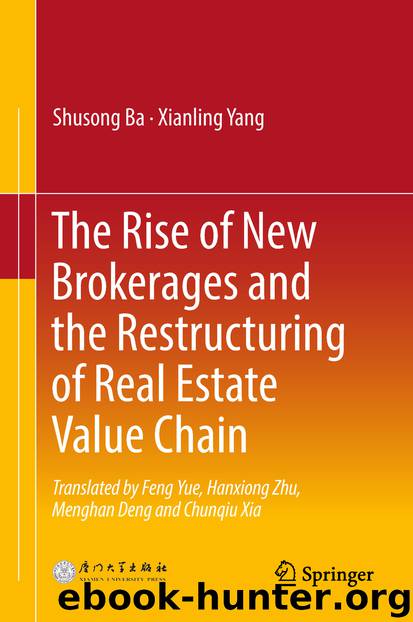The Rise of New Brokerages and the Restructuring of Real Estate Value Chain by Shusong Ba & Xianling Yang

Author:Shusong Ba & Xianling Yang
Language: eng
Format: epub
Publisher: Springer Singapore, Singapore
Generally, the custody of funds in China suffers from the following problems:
Under the fund custody mainly conducted by banks, including four-party fund custody and three-party fund custody, the banks need to communicate with customers and examine the provided documents, which means that not fully engaged in transactions, however, the banks should bear the heavy burden of fund custody and deal with trivial paper work, knowing neither the customers’ actual thoughts toward the transaction nor the way to tell the authenticity of the documents. The custody of funds in real estate transactions is, as well, not a major service daily provided in banks, thus it’s hard to guarantee their being professional and highly-efficient.
The problems are so much worse in the fund custody conducted by governments. Being far from actual transactions, the government lacks flexibility in the custody, and specializes only in setting up key conditions to unfreeze funds. The custody of funds needs and only needs to meet the regulations set by the government before being recognized as compliant. Worse still, the limitations on working time and places makes crowds and long queues of people waiting a routine. In a nutshell, the
custody of funds conducted by the government is characterized by low efficiency.
It’s out of question that the custody of funds could improve the security of transaction, but all of them could severely reduce the efficiency and customer experience of the transactions. Nowadays, the mounting demand in market and the growing complexity of transactions are inevitably prolonging the transactions and adding uncertainties to the procedures.
International experiences, however, show that the custody of funds conducted by third parties can well cushion such deduction of transaction efficiency. In China, the third parties are usually played by third-party payment firms, which complement the fund custody of banks by entering into cooperation agreement with banks, establishing provision accounts, and transforming the bank’s personal services targeting private business into public services targeting payment firms. As a consequence, the banks are no longer the major conductor of fund custody, but a keeper of capital. Meanwhile, the payment firms, by employing online payment technology and fully engaging in transactions, can now provide energy-and-time saving services of account establishment and fund deposit, and are highly flexible in unfreezing capital at the customer’s well (See Fig. 35).
Fig. 35The custody of funds with third-party payment firms.
Source Market Research Centre, Homelink
Download
This site does not store any files on its server. We only index and link to content provided by other sites. Please contact the content providers to delete copyright contents if any and email us, we'll remove relevant links or contents immediately.
Rich Dad Poor Dad by Robert T. Kiyosaki(6612)
Pioneering Portfolio Management by David F. Swensen(6289)
How To Win Friends and Influence People by Dale Carnegie(4504)
The Money Culture by Michael Lewis(4198)
The Dhandho Investor by Mohnish Pabrai(3759)
The Wisdom of Finance by Mihir Desai(3735)
Liar's Poker by Michael Lewis(3441)
Fooled by Randomness: The Hidden Role of Chance in Life and in the Markets by Nassim Nicholas Taleb(3108)
The ONE Thing by Gary Keller(3066)
The Intelligent Investor by Benjamin Graham Jason Zweig(3036)
Mastering Bitcoin: Programming the Open Blockchain by Andreas M. Antonopoulos(3035)
The Psychology of Money by Morgan Housel(2982)
Rich Dad Poor Dad: What The Rich Teach Their Kids About Money - That The Poor And Middle Class Do Not! by Robert T. Kiyosaki(2950)
Investing For Dummies by Eric Tyson(2948)
How to Day Trade for a Living: Tools, Tactics, Money Management, Discipline and Trading Psychology by Andrew Aziz(2944)
How to Win Friends and Influence People by Dale Carnegie(2912)
Market Wizards by Jack D. Schwager(2697)
How to Pay Zero Taxes, 2018 by Jeff A. Schnepper(2646)
Zero Hour by Harry S. Dent Jr. & Andrew Pancholi(2645)
